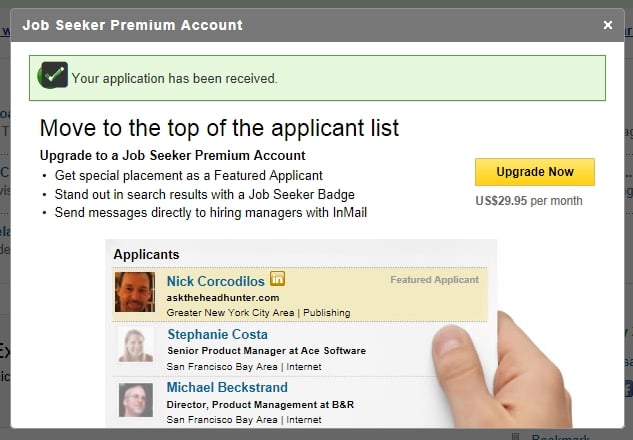In the January 17, 2017 Ask The Headhunter Newsletter, a boss tries to turn a new employee’s LinkedIn profile into an ad for the business. Is this LinkedIn extortion?
Question
My new employer wants me to list in my LinkedIn profile that I’m working for her, and to include the company’s logo, but I’m still in the 90-day probationary period of my new business development job. I don’t want other employers to see it yet. She’s made no commitment to me, and besides, I still don’t have the private office or company phone she promised.
She has also strongly suggested that I change my profile so my “message aligns with the company’s.” She’s very into branding, and wants her business to be found when people find my profile — yet she does not list any of her employees on the company’s website. Besides, my LinkedIn profile is my marketing piece, not my employer’s! She even asked me to delete the last part of my summary in which I list what roles I’m looking for next in my career.
I’ve tried to skirt this politely, but today she asked me when I’m going to do it. Because this job is different from others I’ve had, she wants me to omit key words from old jobs that aren’t consistent with her business. Meanwhile, I’m really trying to make this job a success. I just don’t like being pressured to re-write my resume — that’s what a LinkedIn profile is, after all — so it “aligns with the company’s message.”
I really want this job to work out. What should I do?
Nick’s Reply
Is your boss a dummy? She’s ridiculous to presume she has any right to dictate what you put on your LinkedIn (or any other social media) page. Unless, of course, she’s willing to pay you an advertising fee… (more on this later).
If you’re going to add this new job to your LinkedIn profile, she has to earn it. I once had a girlfriend who insisted I wear a “friendship ring” so that people could see I was “attached.” We soon parted company.
Look at it this way (she clearly doesn’t): Would your boss ask to see your new resume, so she can pass judgment on what you include about her company? What’s the difference between that and your LinkedIn page?
LinkedIn extortion
This looks like a kind of extortion: Let me control your LinkedIn profile and I’ll let you keep your job.
Rather than assert any rights over your social media assets, your boss should stay mum and hope you decide on your own to add her company to your LinkedIn profile. Just like my old girlfriend should have stuck to hoping we’d stay together — without demanding that I “brand” myself with her logo.
Is your LinkedIn profile part of your boss’s advertising and branding? Or is it yours? I’ve never heard of an employer making this kind of demand.
Will she ask you to alter your Facebook page next? Will she ask you to start tweeting about her business from your personal Twitter account? Where will it end?
So, what do you do? You can talk with her frankly and tell her your LinkedIn page is not up for discussion. Or you can do what she asks and take your chances. However, I think you have a card to play here. If you decide to post something on your profile to make a concession, I’d ask for something back. Maybe like this:
How to Say It
“My social media pages are not intended to promote anyone’s business — they promote me. Listing my current job is a small part of what defines me. I would add more about this job after I’ve been here for a year, but I’d consider adding it now if you’re willing to end my probationary period and make a full commitment to me — including providing the office and company phone you promised.”
Does that sound too strong? Then modify it to suit you. But do you see the point? Sometimes, you have to test your boss — because I think your boss is testing you. You might as well find out sooner rather than later whether this is someone you really want to work for long-term. For example, if you’re concerned about broken promises regarding an office and phone, you may realize other promises are on the line, too: What to say to a stingy boss.
Here’s another way to help her see your point, since she’s so focused on marketing:
How to Say It
“With all due respect, using my LinkedIn profile to promote the company would be like you buying ad space on a website — and of course I’d never ask you to buy space on my LinkedIn page. I think there has to be some separation between the company’s marketing and an employee’s own professional marketing.”
Am I serious — should you offer up your LinkedIn profile if your boss pays you? Of course not. I’m trying to make a point. Tweak my suggestions as necessary, or don’t use them at all. It’s food for thought. (So is a larger question: Is your boss too preoccupied with LinkedIn as a marketing tool? She should read LinkedIn: Just another job board.)
Realistically, your LinkedIn profile is not going to drive any business to your boss, any more than your resume would! It’s clear to me your boss has already made you uncomfortable by suggesting a kind of LinkedIn extortion, and that should not be. At some point, you must draw a line – even if it risks your job.
(For more about personal branding for career advancement, see Branding yourself suggests you’re clueless.)
Is this LinkedIn extortion? Would you let your employer have any control over what’s on your LinkedIn profile? How would that affect your marketability to other employers? What should this reader do?
: :




